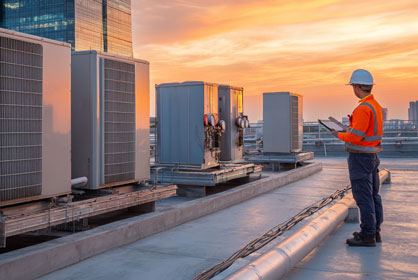A single commercial HVAC setup often must heat or cool far larger spaces (with many occupants or vast open areas) and handle more intricate zone controls than a home system. These units tend to be much larger and more powerful to meet high demand, and are frequently installed on rooftops or mechanical rooms to save space and reduce indoor noise.
Commercial equipment also usually integrates advanced controls and multiple components (large compressors, cooling towers, expansive duct networks, etc.) to maintain consistent comfort across an entire building. In short, keeping a commercial environment comfortable and healthy requires robust HVAC solutions – and specialized care to keep those solutions running optimally.
